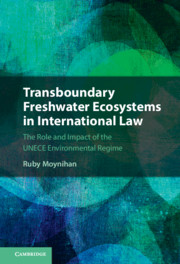 Transboundary Freshwater Ecosystems in International Law
Transboundary Freshwater Ecosystems in International Law Published online by Cambridge University Press: 01 October 2021
The latest Sustainable Development Goal (SDG) reporting exercise demonstrated the wide spectrum of arrangements and shortcomings for transboundary cooperation at the river basin level in the UNECE regime, from basins with comprehensive legal frameworks to basins with no agreement at all. Transboundary water cooperation works best when there is a basin-level agreement and these agreements should be more detailed than regional or global treaties but must incorporate these rules and principles. This chapter identifies how the UNECE water regime contributes to transboundary water cooperation at the basin level through the development of basin agreements, river basin organisations and less formal cooperative arrangements. It identifies how the UNECE has supported implementation and compliance with the UNECE regime and international law at basin and national level and the involvement of non-state actors. It examines a range of basin arrangements including those with no agreement, like the Western Bug, or basins with advanced frameworks like the Danube and Sava. It also analyses the value of the UNECE regime in basins already subject to EU environmental law – seeking to understand the specific contribution of the UNECE vis-à-vis the EU law and discusses why EU states have demonstrated interest in the UNECE regime.
To save this book to your Kindle, first ensure [email protected] is added to your Approved Personal Document E-mail List under your Personal Document Settings on the Manage Your Content and Devices page of your Amazon account. Then enter the ‘name’ part of your Kindle email address below. Find out more about saving to your Kindle.
Note you can select to save to either the @free.kindle.com or @kindle.com variations. ‘@free.kindle.com’ emails are free but can only be saved to your device when it is connected to wi-fi. ‘@kindle.com’ emails can be delivered even when you are not connected to wi-fi, but note that service fees apply.
Find out more about the Kindle Personal Document Service.
To save content items to your account, please confirm that you agree to abide by our usage policies. If this is the first time you use this feature, you will be asked to authorise Cambridge Core to connect with your account. Find out more about saving content to Dropbox.
To save content items to your account, please confirm that you agree to abide by our usage policies. If this is the first time you use this feature, you will be asked to authorise Cambridge Core to connect with your account. Find out more about saving content to Google Drive.